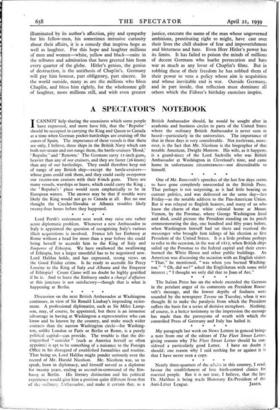Discussion on the next British Ambassador at Washington continues, in
view of Sir Ronald Lindsay's impending retire- ment. A professional diplomatist, such as Sir Miles Lamp- son, may, of course, be appointed, but there is an immense advantage in having at Washington a representative who can know and be known by the country, and make much wider contacts than the narrow Washington circle—for Washing- ton, unlike London or Paris or Berlin or Rome, is a purely political capital—can provide. The trouble is that the dis- tinguished " outsider " (such as America herself so often appoints) is apt to be something of a nuisance to the Foreign Office in his disregard of established formalities and routine. That being so, Lord Halifax might ponder seriously over the record of Mr. Harold Nicolson. Mr. Nicolson was, so to speak, born in diplomacy, and himself served as a diplomat for twenty years, ending as second-in-command of the Em- bassy at Berlin. His literary distinction and his political experience would give him a position quite different from that of thz ordinary Ambassador, and make it certain that, as a British Ambassador should, he would be sought after in academic and business circles in parts of the United States where the ordinary British Ambassador is never seen or heard—particularly in the universities. The importance of that in these days is very considerable. Not irrelevant, more over, is the fact that Mr. Nicolson is the biographer of that notable American, Dwight Morrow. His wife, as it happens, is a grand-niece of the Lord Sackville who was British Ambassador at Washington in Cleveland's time, and came home in unfortunate circumstances—not discreditable to himself.










































 Previous page
Previous page